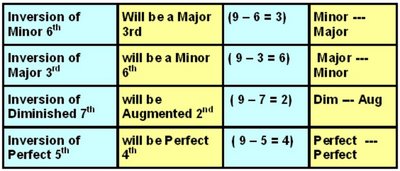Now one more new concept we will learn and that is the Inversion of Intervals…
Many of you know that, in mathematics, any degree of angle can be expressed as the Complimentary of 180 degree also.
Same way, here also the interval measured in one direction can be complimented in the other direction backward (from the same base note) and that’s simple called inversion.
For example remember the Middle C.
If we measure the interval to a note G which is placed above in the Stave (meaning, in the key board you will travel upward to right from Middle C to locate this G..) the interval is Perfect 5th as we know that.
Suppose if we want measure the interval for G which is placed below the middle C in the stave, which will be coming in the Bass Clef..(meaning, you will travel downward to left from middle C to locate this G..), the interval if measure this will be Perfect 4th!
Keeping the C at center, the interval of C to G upwards – Perfect 5th. The inversion of this interval is C to G downwards is Perfect 4th.
Like this we may locate any inversion of intervals.
But there is a simple mathematical solution to that.
Any interval if you invert it, you have to deduct the interval number from 9, and the quality or name of the interval will be inverted as follows :

So Simple…!
For example C to D is a Major 2nd.
Its inversion ( C to D located in reverse direction) will be Minor (9-2 =7) so Minor 7th.
(You check it through semitone methods also).
Some more examples to explain :

And so on…….!
So with the above understandings and methodlogies, we can more or less master the intervals of any notes.
And Chords are built up of two or more intervals !
We will see about the Chords in our next session
Many of you know that, in mathematics, any degree of angle can be expressed as the Complimentary of 180 degree also.
Same way, here also the interval measured in one direction can be complimented in the other direction backward (from the same base note) and that’s simple called inversion.
For example remember the Middle C.
If we measure the interval to a note G which is placed above in the Stave (meaning, in the key board you will travel upward to right from Middle C to locate this G..) the interval is Perfect 5th as we know that.
Suppose if we want measure the interval for G which is placed below the middle C in the stave, which will be coming in the Bass Clef..(meaning, you will travel downward to left from middle C to locate this G..), the interval if measure this will be Perfect 4th!
Keeping the C at center, the interval of C to G upwards – Perfect 5th. The inversion of this interval is C to G downwards is Perfect 4th.
Like this we may locate any inversion of intervals.
But there is a simple mathematical solution to that.
Any interval if you invert it, you have to deduct the interval number from 9, and the quality or name of the interval will be inverted as follows :

So Simple…!
For example C to D is a Major 2nd.
Its inversion ( C to D located in reverse direction) will be Minor (9-2 =7) so Minor 7th.
(You check it through semitone methods also).
Some more examples to explain :

And so on…….!
So with the above understandings and methodlogies, we can more or less master the intervals of any notes.
And Chords are built up of two or more intervals !
We will see about the Chords in our next session
Dear CSR,
ReplyDeleteI finally finished reading all 53 lessons so far (started reading from last week!). Though I have been "learning" music (both WCM and CCM) by reading articles online for last several years, I really enjoyed reading your lessons and learnt many new things. Please continue the good work. I would also like it if you could cite more examples from IR songs.
Regards,
Ananth
Dear Ananth,
ReplyDeleteI am quite some time waiting for some reasonable comments on these lessons from anybody. Atlast I received this one. Thank you Ananth.
IR song examples I wanted to add more. Though I started, but there are limitations of hosting song clips permanently with links (for everybody to easily approach and understand).
When I first posted at yahoo club, even I could not put the tables and figures, now atleast that is solved to some extent.
Ananth I beleive, after seeing your guitar tab pages etc, you are quite knowledgable in both theory and practical side. So please forward your comments on these postings either here or to my email id (ramasamis@yahoo.co.in) whenever you find time.
Regards
CSR